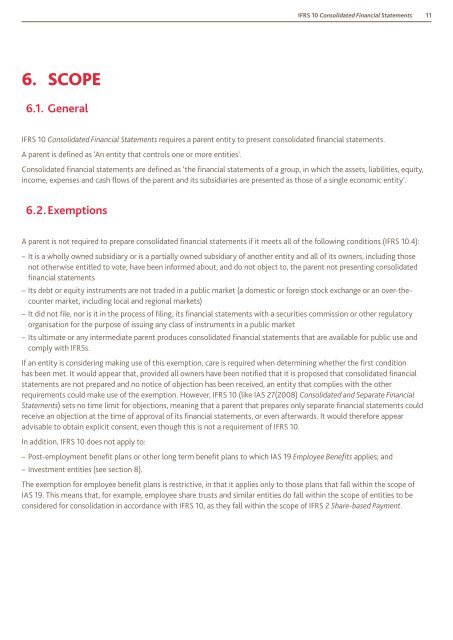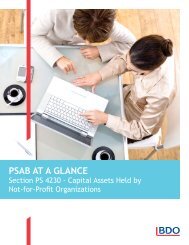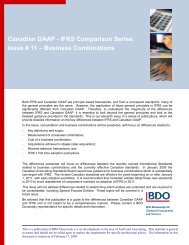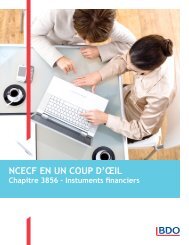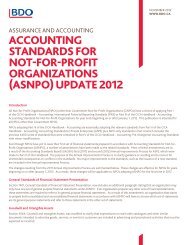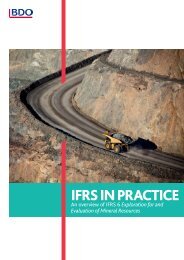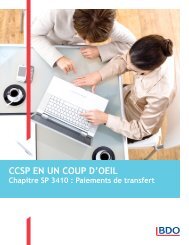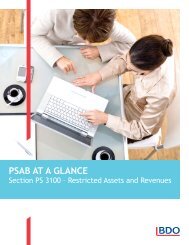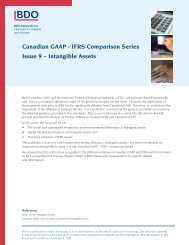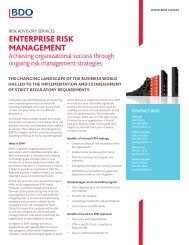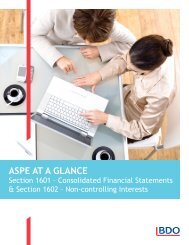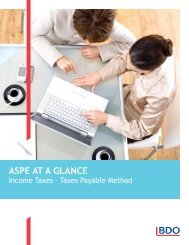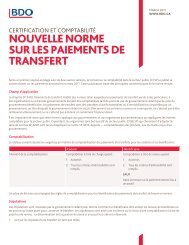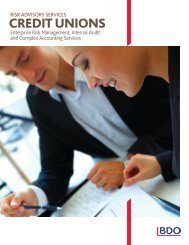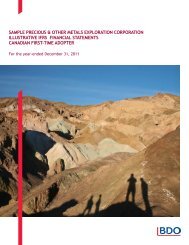Need to Know: IFRS 10 - Consolidated Financial ... - BDO Canada
Need to Know: IFRS 10 - Consolidated Financial ... - BDO Canada
Need to Know: IFRS 10 - Consolidated Financial ... - BDO Canada
- No tags were found...
Create successful ePaper yourself
Turn your PDF publications into a flip-book with our unique Google optimized e-Paper software.
<strong>IFRS</strong> <strong>10</strong> <strong>Consolidated</strong> <strong>Financial</strong> Statements116. Scope6.1. General<strong>IFRS</strong> <strong>10</strong> <strong>Consolidated</strong> <strong>Financial</strong> Statements requires a parent entity <strong>to</strong> present consolidated financial statements.A parent is defined as ‘An entity that controls one or more entities’.<strong>Consolidated</strong> financial statements are defined as ‘the financial statements of a group, in which the assets, liabilities, equity,income, expenses and cash flows of the parent and its subsidiaries are presented as those of a single economic entity’.6.2. ExemptionsA parent is not required <strong>to</strong> prepare consolidated financial statements if it meets all of the following conditions (<strong>IFRS</strong> <strong>10</strong>.4):––It is a wholly owned subsidiary or is a partially owned subsidiary of another entity and all of its owners, including thosenot otherwise entitled <strong>to</strong> vote, have been informed about, and do not object <strong>to</strong>, the parent not presenting consolidatedfinancial statements––Its debt or equity instruments are not traded in a public market (a domestic or foreign s<strong>to</strong>ck exchange or an over-thecountermarket, including local and regional markets)––It did not file, nor is it in the process of filing, its financial statements with a securities commission or other regula<strong>to</strong>ryorganisation for the purpose of issuing any class of instruments in a public market––Its ultimate or any intermediate parent produces consolidated financial statements that are available for public use andcomply with <strong>IFRS</strong>s.If an entity is considering making use of this exemption, care is required when determining whether the first conditionhas been met. It would appear that, provided all owners have been notified that it is proposed that consolidated financialstatements are not prepared and no notice of objection has been received, an entity that complies with the otherrequirements could make use of the exemption. However, <strong>IFRS</strong> <strong>10</strong> (like IAS 27(2008) <strong>Consolidated</strong> and Separate <strong>Financial</strong>Statements) sets no time limit for objections, meaning that a parent that prepares only separate financial statements couldreceive an objection at the time of approval of its financial statements, or even afterwards. It would therefore appearadvisable <strong>to</strong> obtain explicit consent, even though this is not a requirement of <strong>IFRS</strong> <strong>10</strong>.In addition, <strong>IFRS</strong> <strong>10</strong> does not apply <strong>to</strong>:––Post-employment benefit plans or other long term benefit plans <strong>to</strong> which IAS 19 Employee Benefits applies; and––Investment entities (see section 8).The exemption for employee benefit plans is restrictive, in that it applies only <strong>to</strong> those plans that fall within the scope ofIAS 19. This means that, for example, employee share trusts and similar entities do fall within the scope of entities <strong>to</strong> beconsidered for consolidation in accordance with <strong>IFRS</strong> <strong>10</strong>, as they fall within the scope of <strong>IFRS</strong> 2 Share-based Payment.


